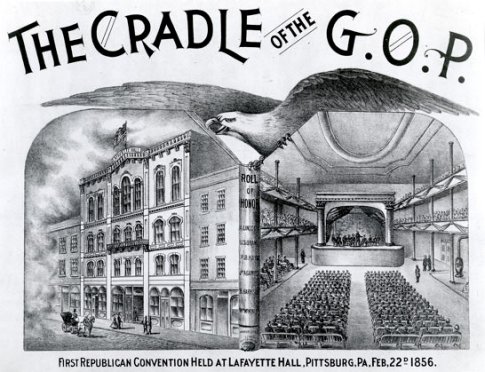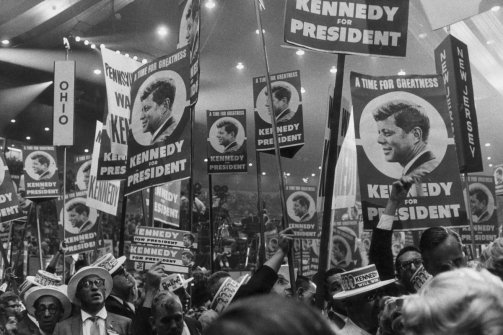The national Republican Party will convene today in Tampa to put forth to the American people their best scripted vision of what an elected Republican President and legislature would accomplish given the chance to represent the American nation as elected officials. And it will be a scripted vision. The days of suspense, argument about platforms, dark horse candidates competing for the presidential nomination, floor demonstrations, and incalculable outcomes are in the distant past. The state primary system forever eliminated the suspense by allowing the best funded candidates with the most momentum to early on coalesce an overwhelming number of the selected state delegates to their side prior to the convention nominating process. The convention nomination has become, as a result, a coronation rather than a contested vote. Whether this picks the best, most representative candidates for the party and ultimately the nation can be argued, but it certainly detracts from the compelling need to watch the conventions for their drama.
That said, there are compelling reasons to watch the story unfold in Tampa, given the importance building to the 2012 election as a bellwether election as to what kind of country fundamentally Americans want to live in. Mitt Romney, the presumptive Republican candidate, is little known beyond the caricature placed upon him by the national media, and is up against the all time media favorite candidate in President Obama, personally well liked, and stuffed with cash to help define Romney. The republican convention is Romney’s chance to own his own story and the larger Republican story to the nation, and how he handles the questions raised by his nomination will be drama enough.
Tea Party vs Establishment – The surging popular force of Republican Party success over the last three years has been on the backs of a highly motivated, highly mobilized grassroots force of common-man activists known as the Tea Party. Set on fire by both parties’ profligate deficit spending, arrogance in tax policy and big government regulation, and general ignorance and abandonment of the country’s founding constitution as the template upon which American rights and governance should be based, the Tea Party achieved huge electoral success in 2010. Over 60 legislative seats switched parties, 6 Senate seats, and a majority of state houses. This ability to organize electoral victories has continued in the stunning results in elections in Wisconsin and Texas, and the Tea Party is primed to see their principles become the dominant platform of the national Republican Party, or they will find another outlet for their ideas. Mitt Romney is not the Tea Party’s candidate, and as the establishment figure he needs to find a way to marshall their revolutionary zeal and reflect their voice, without being pegged as rigid himself. The naming of Paul Ryan as Vice Presidential nominee went a long way toward accomplishing that. The neglect and rejection of powerful Tea Party representative Sarah Palin as a speaker at the convention did not. A delicate ballet is unfolding and the final answer and ultimate electoral victory may be in Romney’s acceptance speech.
Paul Ryan and the Wisconsin Revolution – When Paul Ryan was named by Romney as Vice Presidential nominee it was not only an affirmation of the congressman from Janesville but the entire revolution in governmental policy projecting from the state of Wisconsin. Wisconsin, long a progressive, left leaning state, has been cresting on the wave of a fundamental movement, and by selecting Ryan, Romney has taken on the mantle as his own. The origins of the Wisconsin political earthquake started with Tommy Thompson’s Welfare to Work concepts, but the revolution has seen fruition through the Reaganesque triumvirate of Reince Priebus, now Chairman of the Republican National Committee, Governor Scott Walker, and Representative Ryan himself. The tenets of the Wisconsin idea are founded on budgetary discipline, small business support, limited regulatory suppression, individual rights and responsibilities, and upfront and definitive tackling of entitlements. With two of the three national positions in the hands of Wisconsin revolutionaries, Romney must make the case to the American people why the Wisconsin Vision should be the National vision. A very compelling case can be made, given our national impending deficit crisis, but Romney and Ryan must articulate it in a way that appeals to all Americans and reassures them. The convention will give them the national stage to make just that case.
Romney vs Obama – Americans like and respect their Presidents, and the process of rejecting a tried product for an untried one is one that since the beginning of the 20th century has proved to be a daunting task for the challenger. Romney must not only face such history and President Obama’s personal likability, but also a narrative rigidly adhered to by the press that the liberal candidate stands for the average American, the conservative one for the elite. In such an environment, Obama’s partial birth abortion stance is seen as mainstream, while Romney’s personal support for right to life is considered extreme, Obama’s cumulative addition to the deficit now more than all the previous President’s combined is seen as providing a safety net, Romney’s fiscal responsibility as pointed at the downtrodden, and Obama’s 700 billion dollar carve out of Medicare funds to underwrite Obamacare is seen as maintaining Medicare “as you know it” while Romney’s support of the Ryan plan is seen as scuttling it. How Romney frames whether his vision for the future of America is “Extreme” or “Common Sense” will go a long way to determine whether the independent voter stays with Obama or determines to secure his future with Romney.
It is enjoyable to read history books about how political conventions were once about wheeling and dealing, back stabbing, suspense, and surprise. The 103 ballots for the 1924 Democrat National Convention to nominate John W. Davis to be the sacrificial lamb against Calvin Coolidge, or the final convention suspense of the Republican Convention of 1976, when Gerald Ford and Ronald Reagan came to the convention essentially tied in support of electors, is a thing of the past. The conventions are still, however, the home of the ultimate expressions of American political thought and organization, and as such remain tied to original concepts laid out by the founders, that We the People, will formulate our futures through elections and will fight for our vision of this great nation at the ballot box. That is excitement enough for me.


